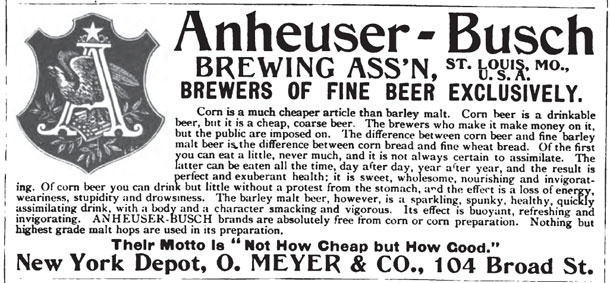
This particular advertisement appeared in Puck magazine Feb. 22, 1893 as part of a national campaign mounted by Anheuser-Busch. It does not mention that A-B used rice rather than corn, so it would seem that the rather constant referral to the use of rice in Super Bowl commercials that just aired is a step toward truth in advertising.
In all fairness, A-B long ago quit obscuring the fact that Budweiser was brewed with rice, as Bud Light is today. As soon at large breweries began using adjuncts in the final decades of the nineteenth century there were arguments about whether corn or rice was superior.
On January 30, 1881, well before A-B took aim on beers brewed with corn, the author of a full-page article in the Chicago Daily Tribune chose the side of rice in the rice versus corn debate. The author stated, “Corn beer is not a drink for Americans or Germans. It is good enough for the Spaniards, Greasers, Indians, and the mongrel breeds of South America.” Instead the author lauded the exceptional crisp taste that resulted with rice, and added, “for years the ‘blonde,’ or light colored beers have been fashionable and grown into public favor in America.” The author also suggested most breweries in Chicago used rice, while Milwaukee brewers used corn.
Anheuser-Busch founder Adolphus Busch, who ultimately had made the decision to brew Budweiser with rice, spoke often and bluntly about his distaste for beers made with corn. “Our main argument must be the quality of our product, that we do not use any corn,” he said in 1895. “While nearly every other beer brewed in this country, with hardly one exception, is made of cheaper material, viz: corn; that such a beer is not as wholesome or digestible as pure barley malt beer, the small addition of rice only improving it, and that the use of corn makes a very inferior article. The difference in the cost of manufacture between a barley malt and rice beer and corn beer is one dollar per barrel in favor of the latter, as a matter of course.”